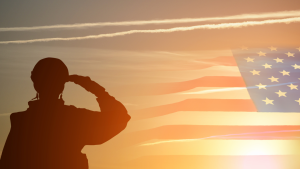Can Cannabis Successfully Treat PTSD in Veterans?
In many ways, we have the United States veterans to thank for much of the advocacy we have seen nationwide around medical cannabis, namely because of how cannabis has been helping those living Post Traumatic Stress Disorder (PTSD).
As of 2021, it was estimated that there are 19 million United States citizens who are veterans of a conflict with U.S. involvement. As of now, Gulf War-era veterans, which encompasses those serving between 1990 and present, account for the largest share of all U.S. veterans, followed by veterans of the Vietnam era, the Korean conflict, and those veterans from World War II.
Can cannabis treat PTSD? Can veterans find success in coping with Post Traumatic Stress Disorder through cannabis?
In this article, we will look at some of the ways U.S. veterans have impacted the medical cannabis movement, some of the science behind cannabis and Post Traumatic Stress Disorder, and why thousands are finding relief and hope through obtaining their medical cannabis certification.
The History of Post Traumatic Stress Disorder for Veterans
While mental health is something that is becoming more widely talked about, many of us know that it wasn’t always that way.
It wasn’t until 1952 that the American Psychiatric Association (APA) produced the first Diagnostic and Statistical Manual of Mental Disorders (DSM-I), yet the issue of trauma, and how people react to it, had been widely misunderstood, often characterized as some sort of anxiety disorder.
In 1980, the APA added Post Traumatic Stress Disorder, or PTSD, to DSM-III, after research examined the trauma responses of Vietnam War Veterans, Holocaust survivors, sexual trauma victims, and others that had been victimized or experienced significant trauma, and finally, the connection between military service and war and trauma was finally made.
Before that, it had widely been known as “shell shock”. The criteria for diagnosis Post Traumatic Stress Disorder changed over the years as it became more understood.
Currently, the criteria for a Post Traumatic Stress Disorder diagnosis include:
- reliving the traumatic event (also called re-experiencing or intrusion);
- avoiding situations that are reminders of the event;
- negative changes in beliefs and feelings;
- feeling keyed up (also called hyperarousal or over-reactive to situations)
For a diagnosis, all four symptoms will have lasted for at least a month and be causing distress and issues with daily functioning.
It should be noted that these symptoms of PTSD are certainly not limited to those who served in the military or in war.
These are realities that are experienced by trauma victims of all kinds. It’s estimated that about 4 out of every 100 American men (or 4%) and 10 out of every 100 American women (or 10%) will be diagnosed with PTSD in their lifetime.
Post Traumatic Stress Disorder & The Endocannabinoid System
As we say in most of our patient education articles at Compassionate Clinics of America, most of the research on cannabis medicine, and therefore Post Traumatic Stress Disorder, cannabis hinges on the endocannabinoid system (ECS).
The endocannabinoid system exists in the bodies of all mammals, acting as a regulator of all bodily systems, including, but not limited to, those systems that regulate sleep, mood, appetite, memory, and reproduction, working to bring the body into balance or homeostasis.
It can be best described by prominent cannabis researcher Dr. Ethan Russo as “a key mediator of physiological homeostasis, thus ensuring that various bodily systems function within tight parameters with neither a deficiency nor excess of activity”.
As we noted in our article, “A Complete Guide to the Endocannabinoid System”, the body naturally produces cannabinoids, known as endogenous cannabinoids or endocannabinoids, that work with the endocannabinoid system in the regulation of bodily systems.
A key component of the ECS is that it is made of two main receptors, the CB1 and CB2, which are designed to act as “master conductors” of signals throughout the whole body, with each receptor being responsible for different areas of the body, as demonstrated in the below graphic:

Cannabis, The Bliss Molecule & PTSD
Endogenous cannabinoids, or endocannabinoids that already exist in our body are the key regulators of the endocannabinoid system’s ability to regulate the above-mentioned bodily systems.
When it comes to mood regulation, or regulation of mental health and wellness, the endocannabinoid anandamide is of key importance.
Anandamide is known to play a role in sleep, mood, memory, appetite, reproduction, and how the body experiences pain, and is commonly known as “the bliss molecule”. In simple terms, anandamide exists within our bodies to make us feel good.
Research is looking into the connection between PTSD, cannabinoids, and anandamide in the amygdala, the part of the brain responsible for emotions and the controlling of aggression.
Through animal studies, they are looking at how augmenting levels of anandamide in the amygdala modulates short-term fear extinction (or one’s ability to move past that feeling of being scared, increasing one’s ability to cope with these episodes over time.
What happens is that increased levels of anandamide essentially reprogram their natural “fight or flight” mode that may be experienced in a nightmare, flashback, or other trauma triggers.
In cannabis medicine programs that seek to help those living with Post Traumatic Stress Disorder, the introduction of THC is believed to mimic anandamide and, thus, bring on those coping mechanisms for triggers of trauma.
Cannabis & Flight or Flight
In 2020, a Wayne State University study took the prior research and applied it to human participants to see how a low dose of cannabis impacts the amygdala that drives the “fight or flight” response.
The results found that adults suffering from PTSD who consumed low doses of THC had a lowered threat-related amygdala reaction. Learn more about this cannabis and PTSD study in the below video:
Seek Mental Health Support for PTSD
If you feel as though you’re living with PTSD, there is support for you. Here are a list of mental health hotlines:
- National Alliance on Mental Illness (NAMI): (800) 950-NAMI (6264). Available Monday through Friday between 10 a.m. and 6 p.m. EST, hotline staff are prepared to answer any mental health questions you may have. If you prefer, you can also text NAMI to 741741 for free support.
- Substance Abuse and Mental Health Services Administration (SAMHSA): (800) 662-HELP (4357). Available 24/7, 365 days a year, the professionals on the phone can provide treatment information and referrals in English and Spanish to people who have questions about mental health or substance abuse disorders.
- MentalHealth.gov: (877) 726‑4727. This hotline is available between 8 a.m. and 8 p.m. EST to provide mental health information and treatment referrals.
- National Institute of Mental Health (NIMH): 1-866-615-6464 (toll-free), 1-301-443-8431 (TTY), or 1-866-415-8051 (TTY toll-free). Available between 8:30 a.m. and 5 p.m. EST, professionals can answer any mental health-related question in English or Spanish and attend to requests for copies of NIMH brochures.
- Boys Town: (800) 448-3000. Specially trained Boys Town counselors are available 24/7, 365 days a year to provide crisis support specifically for children and their families.
If you are a Veteran in crisis, the Veterans Crisis Line is available by dialing 988, then pressing 1 when prompted from your phone. You can also text 838255 to access support through text.
Find Support for PTSD with a Medical Cannabis Certification
Whether you are living with PTSD from military service, or you have experienced another kind of trauma, or series of traumas, whose effects are impacting your day to day life, know you are not alone. You have gone through something that many people don’t have to go through, nor will many people understand, but there is support out there.
If you are living in Arizona, Arkansas, California, Connecticut, Delaware, Georgia, Illinois, Iowa, Louisiana, Maine, Maryland, Massachusetts, Michigan, Minnesota, Missouri, Montana, Nevada, New Jersey, New York, Ohio, Oklahoma, Pennsylvania, Texas, Utah, Vermont, Virginia, & West Virginia,, and are living with PTSD as a military veteran, consider exploring the benefits of getting your medical cannabis certification with Compassionate Clinics of America.
The Veterans Medical Marijuana Safe Harbor Act provides protection for veterans to use, possess, or transport medical cannabis and to discuss the use of cannabis with a physician of the Department of Veterans Affairs as authorized by a State or Indian Tribe, and for other purposes.























